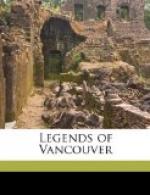One of the great secrets of England’s success with savage races has been her consideration, her respect, her almost reverence of native customs, ceremonies, and potentates. She wishes her own customs and kings to be honored, so she freely accords like honor to her subjects, it matters not whether they be white, black, or red.
Young Arthur was delighted—royal lads are pretty much like all other boys; the unique ceremony would be a break in the endless round of state receptions, banquets, and addresses. So he accepted the Red Indians’ compliment, knowing well that it was the loftiest honor these people could confer upon a white man.
It was the morning of October first when the royal train steamed into the little city of Brantford, where carriages awaited to take the Prince and his suite to the “Old Mohawk Church,” in the vicinity of which the ceremony was to take place. As the Prince’s especial escort, Onwanonsyshon, head chief of the Mohawks, rode on a jet-black pony beside the carriage. The chief was garmented in full native costume—a buckskin suit, beaded moccasins, headband of owl’s and eagle’s feathers, and ornaments hammered from coin silver that literally covered his coat and leggings. About his shoulders was flung a scarlet blanket, consisting of the identical broadcloth from which the British army tunics are made; this he “hunched” with his shoulders from time to time in true Indian fashion. As they drove along the Prince chatted boyishly with his Mohawk escort, and once leaned forward to pat the black pony on its shining neck and speak admiringly of it. It was a warm autumn day: the roads were dry and dusty, and, after a mile or so, the boy-prince brought from beneath the carriage seat a basket of grapes. With his handkerchief he flicked the dust from them, handed a bunch to the chief, and took one himself. An odd spectacle to be traversing a country road: an English prince and an Indian chief, riding amicably side by side, enjoying a banquet of grapes like two school-boys.
On reaching the church, Arthur leapt lightly to the greensward. For a moment he stood, rigid, gazing before him at his future brother-chiefs. His escort had given him a faint idea of what he was to see, but he certainly never expected to be completely surrounded by three hundred full-blooded Iroquois braves and warriors, such as now encircled him on every side. Every Indian was in war-paint and feathers, some stripped to the waist, their copper-colored skins brilliant with paints, dyes, and “patterns”; all carried tomahawks, scalping-knives, and bows and arrows. Every red throat gave a tremendous war-whoop as he alighted, which was repeated again and again, as for that half moment he stood silent, a slim, boyish figure, clad in light grey tweeds—a singular contrast to the stalwarts in gorgeous costumes who crowded about him. His young face paled to ashy whiteness, then with true British grit he extended




